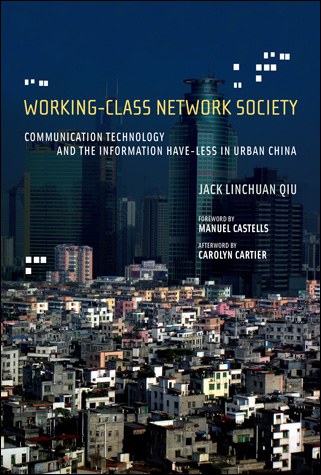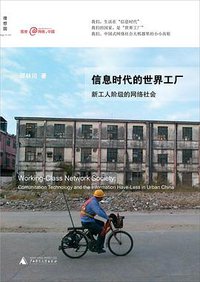Working-Class Network Society
Douban
Communication Technology and the Information Have-Less in Urban China
Jack Linchuan Qiu
overblik
"Contrary to many Information Age pundits and prognosticators, the working class continues to exist; indeed, in contemporary China, it is being reinvented on a gigantic scale and in a new historical form. ICTs, as Jack Linchuan Qiu shows, constitute a vital and fascinating component of this crucial process. Those who assert that class realities have nothing to do with cellphones and Internet services—and vice versa—will have to think again."
—Dan Schiller, Graduate School of Library and Information Science, University of Illinois Champaign-Urbana
"Jack Linchuan Qiu has written the most insightful, empirically grounded account to date of the social role that the Internet and related information and communication technologies have played in the course of China's rapid economic development. Anyone with an interest in the social and economic implications of the Internet in developing economies—whose citizens make up half of today's Internet users—should read this book."
—William H. Dutton, Director, Oxford Internet Institute, University of Oxford
Product Description
The idea of the "digital divide," the great social division between information haves and have-nots, has dominated policy debates and scholarly analysis since the 1990s. In Working-Class Network Society, Jack Linchuan Qiu describes a more complex social and technological reality in a newly mobile, urbanizing China. Qiu argues that as inexpensive Internet and mobile phone services become available and are closely integrated with the everyday work and life of low-income communities, they provide a critical seedbed for the emergence of a new working class of "network labor" crucial to China's economic boom. Between the haves and have-nots, writes Qiu, are the information "have-less": migrants, laid-off workers, micro-entrepreneurs, retirees, youth, and others, increasingly connected by cybercafés, prepaid service, and used mobile phones. A process of class formation has begun that has important implications for working-class network society in China and beyond.
Qiu brings class back into the scholarly discussion, not as a secondary factor but as an essential dimension in our understanding of communication technology as it is shaped in the vast, industrializing society of China. Basing his analysis on his more than five years of empirical research conducted in twenty cities, Qiu examines technology and class, networked connectivity and public policy, in the context of massive urban reforms that affect the new working class disproportionately. The transformation of Chinese society, writes Qiu, is emblematic of the new technosocial reality emerging in much of the Global South.
Information Revolution and Global Politics series
contents
1 Introduction
I Networks Materialized
2 Internet Cafés
3 Going Wireless
II The People of Have-Less
4 Migrants
5 Young and Old
III A New Working Class in the Making
6 Places and Community
7 Life and Death
8 Reflections
Afterword
